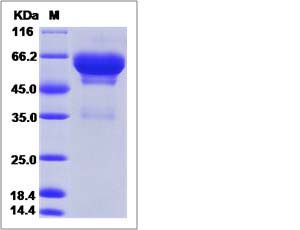Mouse SCG3 / Secretogranin 3 Protein (His Tag)
1B1075,AI385542,Chgd,SgIII
- 100ug (NPP2763) Please inquiry
| Catalog Number | P51561-M08H |
|---|---|
| Organism Species | Mouse |
| Host | Human Cells |
| Synonyms | 1B1075,AI385542,Chgd,SgIII |
| Molecular Weight | The recombinant mouse Scg3 consists of 460 amino acids and predicts a molecular mass of 52.4 kDa. |
| predicted N | Phe 23 |
| SDS-PAGE |  |
| Purity | > 95 % as determined by SDS-PAGE. |
| Protein Construction | A DNA sequence encoding the mouse Scg3 (NP_033156.1) (Met1-Leu471) was expressed with a polyhistidine tag at the C-terminus. |
| Bio-activity | |
| Research Area | Signaling |Signal Transduction |Metabolism |Types of disease |Metabolism in Cancer |
| Formulation | Lyophilized from sterile PBS, pH 7.4. 1. Normally 5 % - 8 % trehalose, mannitol and 0.01% Tween80 are added as protectants before lyophilization. Specific concentrations are included in the hardcopy of COA. |
| Background | SCG3, also known as secretogranin 3, is a member of the chromogranin/secretogranin family. Members of this family may serve as precursors for biologically active peptides. SCG3 is transported to secretory granules (SGs) in neuroendocrine cells. SCG3 binds strongly to chromogranin A (CgA) in an intragranular milieu and targets CgA to SGs in pituitary and pancreatic endocrine cells. With a sucrose density gradient of rat insulinoma-derived INS-1 cell homogenates, SgIII is localized to the SG fraction and is fractionated to the SG membrane (SGM) despite lacking the transmembrane region. |
| Reference | > |
